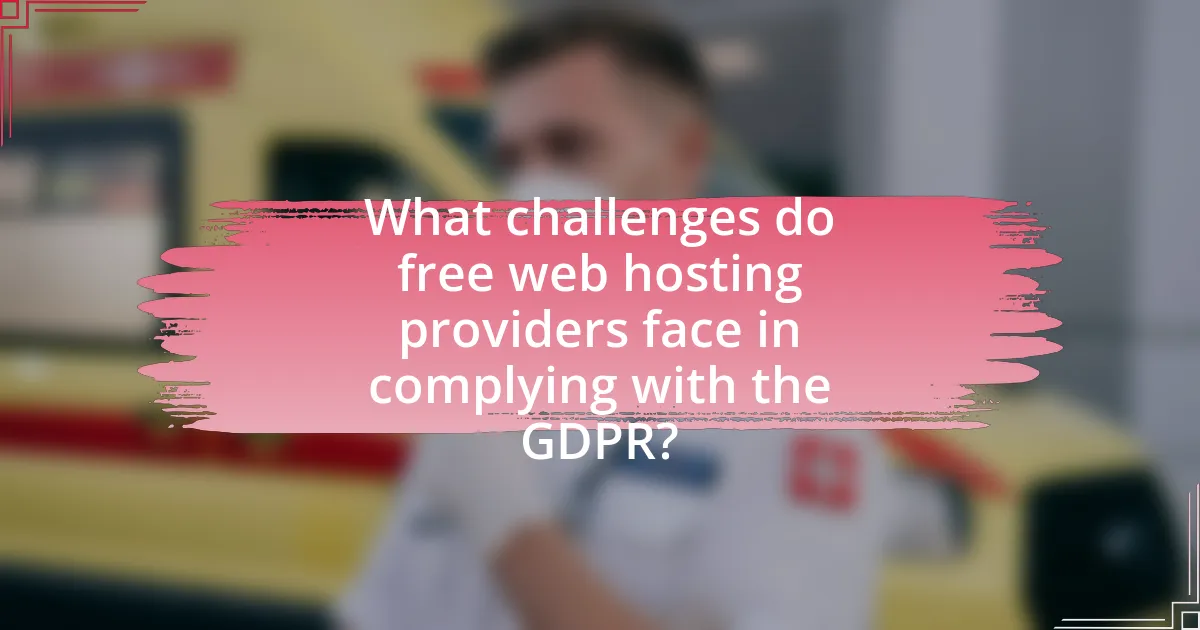The General Data Protection Regulation (GDPR) is a critical data protection law in the European Union that impacts free web hosting providers by imposing strict compliance requirements regarding the handling of personal data. This article outlines the definition of personal data under GDPR, the key principles that govern data processing, and the specific obligations that free web hosting services must adhere to in order to avoid significant fines and reputational damage. It also discusses the challenges these providers face in achieving compliance, including resource limitations and technical hurdles, while offering strategies for effective data protection and user consent management. By understanding and implementing GDPR standards, free web hosting providers can enhance user trust and maintain operational viability in a data-driven environment.

What is the GDPR and its relevance to free web hosting providers?
The General Data Protection Regulation (GDPR) is a comprehensive data protection law in the European Union that governs how personal data of individuals within the EU can be collected, processed, and stored. Its relevance to free web hosting providers lies in the fact that these providers often handle personal data of users, making them subject to GDPR compliance requirements. Free web hosting services must ensure that they implement adequate data protection measures, obtain user consent for data processing, and provide transparency regarding data usage. Non-compliance can result in significant fines, which can reach up to 4% of annual global turnover or €20 million, whichever is higher, emphasizing the critical need for free web hosting providers to adhere to GDPR standards.
How does the GDPR define personal data?
The GDPR defines personal data as any information that relates to an identified or identifiable natural person. This includes data such as names, identification numbers, location data, and online identifiers, which can directly or indirectly identify an individual. The regulation emphasizes that personal data encompasses a wide range of information, reflecting its broad scope to protect individuals’ privacy rights within the European Union.
What types of data are considered personal under the GDPR?
Personal data under the GDPR includes any information that relates to an identified or identifiable natural person. This encompasses a wide range of data types, such as names, identification numbers, location data, online identifiers, and other factors specific to the physical, physiological, genetic, mental, economic, cultural, or social identity of that person. The GDPR defines personal data broadly to ensure comprehensive protection, reflecting the importance of privacy in the digital age.
How does the definition of personal data impact free web hosting providers?
The definition of personal data significantly impacts free web hosting providers by imposing strict compliance requirements under the General Data Protection Regulation (GDPR). Free web hosting providers often collect and process personal data, such as names, email addresses, and IP addresses, which are classified as personal data under GDPR. This classification mandates that these providers implement robust data protection measures, obtain explicit consent from users, and ensure transparency regarding data usage. Failure to comply can result in substantial fines, with penalties reaching up to 4% of annual global turnover or €20 million, whichever is higher, as outlined in Article 83 of the GDPR. Thus, the definition of personal data directly influences the operational practices and legal obligations of free web hosting providers.
What are the key principles of the GDPR?
The key principles of the GDPR are lawfulness, fairness, and transparency; purpose limitation; data minimization; accuracy; storage limitation; integrity and confidentiality; and accountability. These principles guide the processing of personal data, ensuring that it is handled responsibly and ethically. For instance, the principle of lawfulness requires that data processing be based on legitimate grounds, such as consent or contractual necessity, while purpose limitation mandates that data be collected for specified, legitimate purposes and not further processed in a manner incompatible with those purposes. Each principle is designed to protect individuals’ rights and freedoms regarding their personal data, reinforcing the importance of data protection in the digital age.
How do these principles apply to free web hosting services?
The principles of GDPR apply to free web hosting services by mandating that these providers ensure the protection of personal data of their users. Free web hosting services often collect and process personal information, making them subject to GDPR regulations, which require explicit consent for data processing, transparency about data usage, and the implementation of adequate security measures. For instance, if a free web hosting service stores user data without proper consent or fails to provide users with access to their data, it risks non-compliance with GDPR, which can lead to significant fines, potentially up to 4% of annual global turnover or €20 million, whichever is higher. This regulatory framework compels free web hosting providers to adopt privacy policies and practices that align with GDPR standards to avoid legal repercussions and protect user rights.
What obligations do free web hosting providers have under these principles?
Free web hosting providers are obligated to comply with the General Data Protection Regulation (GDPR) principles, which include ensuring the lawful processing of personal data, maintaining transparency with users, and implementing appropriate security measures. These obligations require providers to obtain explicit consent from users before collecting their data, inform users about how their data will be used, and protect that data from unauthorized access or breaches. Non-compliance can result in significant fines, as the GDPR imposes penalties of up to 4% of annual global turnover or €20 million, whichever is higher, reinforcing the necessity for adherence to these principles.
Why is compliance with the GDPR crucial for free web hosting providers?
Compliance with the GDPR is crucial for free web hosting providers because it ensures the protection of personal data and avoids significant legal penalties. Free web hosting providers often handle user data, making them subject to GDPR regulations, which mandate strict guidelines for data processing and storage. Non-compliance can result in fines up to 4% of annual global turnover or €20 million, whichever is higher, as stipulated by the GDPR. This financial risk, combined with potential reputational damage from data breaches, underscores the necessity for these providers to adhere to GDPR standards to maintain user trust and operational viability.
What are the potential consequences of non-compliance?
The potential consequences of non-compliance with GDPR for free web hosting providers include significant financial penalties, legal action, and reputational damage. Specifically, organizations can face fines of up to 4% of their annual global turnover or €20 million, whichever is higher, as stipulated in Article 83 of the GDPR. Additionally, non-compliance can lead to lawsuits from affected individuals or regulatory bodies, further exacerbating financial losses. Reputational damage can result in loss of customer trust and a decline in user base, as consumers increasingly prioritize data protection and privacy. These consequences underscore the critical importance of adhering to GDPR regulations for free web hosting providers.
How can compliance enhance user trust and business reputation?
Compliance enhances user trust and business reputation by demonstrating a commitment to data protection and ethical practices. When businesses adhere to regulations like GDPR, they signal to users that their personal information is handled responsibly, which fosters confidence. According to a study by the International Association of Privacy Professionals, 88% of consumers are more likely to trust companies that comply with privacy regulations. This trust translates into a stronger reputation, as businesses known for compliance are often perceived as more reliable and secure, leading to increased customer loyalty and positive brand perception.

What challenges do free web hosting providers face in complying with the GDPR?
Free web hosting providers face significant challenges in complying with the GDPR due to limited resources and the nature of their business model. These providers often operate on minimal budgets, which restricts their ability to implement necessary data protection measures, such as secure data storage and user consent management systems. Additionally, many free hosting services collect and process personal data without adequate transparency, making it difficult to fulfill GDPR requirements for data subject rights, such as access, rectification, and erasure. The lack of legal expertise in navigating GDPR compliance further complicates their ability to adhere to the regulation, as they may not fully understand the implications of data processing activities.
How do resource limitations affect compliance efforts?
Resource limitations significantly hinder compliance efforts by restricting the ability of organizations to allocate necessary funds, personnel, and technology for adherence to regulations. For instance, free web hosting providers often operate on tight budgets, which limits their capacity to implement robust data protection measures required by GDPR. A study by the European Union Agency for Fundamental Rights indicates that smaller organizations face greater challenges in meeting compliance due to insufficient resources, leading to increased risks of non-compliance and potential fines.
What specific compliance measures are often overlooked by smaller providers?
Smaller providers often overlook data protection impact assessments (DPIAs) and proper consent mechanisms as specific compliance measures under GDPR. DPIAs are essential for identifying and mitigating risks associated with data processing activities, yet many smaller providers neglect to conduct them, which can lead to non-compliance and potential fines. Additionally, smaller providers frequently fail to implement robust consent mechanisms, which are required to ensure that users have given explicit permission for their data to be processed. This oversight can result in violations of GDPR’s principles, as evidenced by the European Data Protection Board’s guidelines emphasizing the importance of these measures for all organizations, regardless of size.
How can free web hosting providers prioritize compliance despite limited resources?
Free web hosting providers can prioritize compliance by implementing automated tools and frameworks that streamline data protection processes. These providers can utilize open-source compliance software to manage user data securely and ensure adherence to GDPR requirements without incurring significant costs. For instance, leveraging tools like GDPR compliance checklists and automated data subject request handling can enhance efficiency. Additionally, training staff on compliance best practices can further mitigate risks associated with limited resources, as informed personnel can better navigate regulatory requirements.
What technical challenges arise from GDPR compliance?
Technical challenges arising from GDPR compliance include data encryption, user consent management, and data portability. Free web hosting providers must implement robust encryption methods to protect personal data, as GDPR mandates that organizations ensure the security of user information. Additionally, managing user consent requires sophisticated systems to track and document consent for data processing, which can be complex and resource-intensive. Furthermore, the requirement for data portability necessitates the development of mechanisms that allow users to easily transfer their data to other services, adding another layer of technical complexity. These challenges are compounded by the need for ongoing compliance monitoring and potential penalties for non-compliance, which can strain the resources of free web hosting providers.
How can data protection measures be effectively implemented in free hosting environments?
Data protection measures can be effectively implemented in free hosting environments by adopting encryption, regular security audits, and user education. Encryption protects data at rest and in transit, ensuring that unauthorized access is minimized. Regular security audits help identify vulnerabilities in the hosting environment, allowing for timely remediation. User education on best practices, such as strong password creation and recognizing phishing attempts, further enhances data security. According to a study by the European Union Agency for Cybersecurity, organizations that implement these measures significantly reduce the risk of data breaches, aligning with GDPR requirements for data protection.
What role does data encryption play in compliance?
Data encryption is essential for compliance with regulations such as the General Data Protection Regulation (GDPR). It protects personal data by converting it into a secure format that can only be accessed by authorized users, thereby reducing the risk of data breaches. According to Article 32 of the GDPR, organizations must implement appropriate technical measures, including encryption, to ensure a level of security appropriate to the risk. This requirement underscores the importance of encryption in safeguarding sensitive information and maintaining compliance with legal standards.

What strategies can free web hosting providers adopt to ensure GDPR compliance?
Free web hosting providers can ensure GDPR compliance by implementing robust data protection measures, obtaining explicit user consent, and providing transparent privacy policies. These providers should encrypt personal data to safeguard it against unauthorized access, as encryption is a key requirement under GDPR. Additionally, they must establish clear mechanisms for users to give and withdraw consent for data processing, ensuring that consent is informed and specific.
Moreover, free web hosting providers should regularly conduct data protection impact assessments to identify and mitigate risks associated with data processing activities. They must also maintain accurate records of data processing activities and ensure that users can easily access, rectify, or delete their personal data, as mandated by GDPR.
By adopting these strategies, free web hosting providers can align their operations with GDPR requirements, thereby protecting user privacy and avoiding potential fines.
How can free web hosting providers implement effective data protection policies?
Free web hosting providers can implement effective data protection policies by adopting robust encryption methods, ensuring compliance with GDPR regulations, and conducting regular security audits. Encryption protects user data during transmission and storage, making it inaccessible to unauthorized parties. Compliance with GDPR mandates that providers obtain explicit consent from users for data processing and implement measures for data access and deletion requests. Regular security audits help identify vulnerabilities and ensure that data protection measures are up to date, thereby minimizing the risk of data breaches. These practices collectively enhance the security and privacy of user data, aligning with legal requirements and fostering user trust.
What best practices should be followed for data handling and storage?
Best practices for data handling and storage include implementing strong encryption, ensuring data minimization, and maintaining regular backups. Strong encryption protects sensitive data both at rest and in transit, reducing the risk of unauthorized access. Data minimization involves collecting only the necessary information, which aligns with GDPR principles and limits exposure in case of a breach. Regular backups ensure data recovery in the event of loss or corruption, which is critical for compliance with GDPR requirements for data integrity and availability. These practices collectively enhance data security and compliance with legal standards.
How can user consent be effectively managed and documented?
User consent can be effectively managed and documented through clear, transparent processes that comply with GDPR requirements. This involves obtaining explicit consent from users before collecting their personal data, ensuring that consent requests are easily understandable and not bundled with other agreements. Documentation should include records of consent, detailing what users agreed to, when they consented, and how they can withdraw their consent at any time. According to GDPR Article 7, organizations must demonstrate that consent was given, which can be achieved through digital logs or consent management platforms that track user interactions and consent status.
What tools and resources are available to assist with GDPR compliance?
Tools and resources available to assist with GDPR compliance include data protection impact assessment (DPIA) tools, consent management platforms, and GDPR compliance software. DPIA tools help organizations identify and mitigate risks associated with data processing activities, ensuring compliance with Article 35 of the GDPR. Consent management platforms facilitate the collection and management of user consent for data processing, aligning with GDPR requirements for transparency and user rights. Additionally, GDPR compliance software provides comprehensive solutions for tracking data processing activities, managing data subject requests, and maintaining records of processing, which are essential for compliance with Articles 30 and 15 of the GDPR. These tools collectively support organizations in navigating the complexities of GDPR regulations effectively.
Which software solutions can help automate compliance processes?
Software solutions that can help automate compliance processes include tools like OneTrust, TrustArc, and ComplyAdvantage. OneTrust provides a comprehensive platform for privacy management and compliance, enabling organizations to automate data mapping, risk assessments, and policy management. TrustArc offers similar functionalities, focusing on privacy compliance and risk management, which helps businesses adhere to regulations like GDPR. ComplyAdvantage specializes in anti-money laundering and compliance solutions, utilizing AI to automate risk assessments and monitoring. These tools are designed to streamline compliance workflows, reduce manual effort, and ensure adherence to regulatory requirements effectively.
How can free web hosting providers leverage external expertise for compliance?
Free web hosting providers can leverage external expertise for compliance by engaging legal consultants and compliance specialists who are knowledgeable about GDPR regulations. These experts can conduct audits to identify compliance gaps, provide training for staff on data protection practices, and assist in the development of privacy policies that align with GDPR requirements. For instance, a study by the European Commission indicates that organizations that utilize external compliance resources are 30% more likely to meet regulatory standards effectively. This approach not only ensures adherence to legal obligations but also enhances the trust of users in the hosting service.
What are the best practices for free web hosting providers to maintain ongoing compliance?
Free web hosting providers should implement robust data protection measures, conduct regular compliance audits, and ensure transparent user consent to maintain ongoing compliance with GDPR. These practices include encrypting user data, providing clear privacy policies, and allowing users to easily access and delete their data. Regular audits help identify compliance gaps, while transparent consent mechanisms ensure users are informed about data usage. According to the European Data Protection Board, organizations must demonstrate accountability and compliance, which reinforces the necessity of these best practices for free web hosting providers.
How can regular audits and assessments improve compliance efforts?
Regular audits and assessments enhance compliance efforts by identifying gaps in adherence to regulations and ensuring that policies are effectively implemented. These evaluations provide organizations with a systematic approach to review their processes, enabling them to detect non-compliance issues early and rectify them promptly. For instance, a study by the International Compliance Association found that organizations conducting regular audits are 30% more likely to meet compliance standards compared to those that do not. This proactive strategy not only mitigates risks associated with non-compliance but also fosters a culture of accountability and continuous improvement within the organization.
What role does staff training play in ensuring compliance?
Staff training plays a crucial role in ensuring compliance with regulations such as GDPR by equipping employees with the necessary knowledge and skills to adhere to legal requirements. Effective training programs inform staff about data protection principles, the importance of safeguarding personal data, and the specific protocols that must be followed to avoid breaches. Research indicates that organizations with comprehensive training programs experience fewer compliance violations; for instance, a study by the Ponemon Institute found that companies with regular training sessions reduced the likelihood of data breaches by 45%. This demonstrates that well-trained staff are essential for maintaining compliance and protecting sensitive information in the context of GDPR for free web hosting providers.
What practical steps can free web hosting providers take to navigate GDPR challenges?
Free web hosting providers can navigate GDPR challenges by implementing robust data protection measures, ensuring transparency in data processing, and obtaining explicit consent from users. These providers should establish clear privacy policies that outline how user data is collected, stored, and used, thereby fostering trust and compliance. Additionally, they must implement technical safeguards such as encryption and regular security audits to protect personal data from breaches. According to the European Data Protection Board, organizations must demonstrate accountability in their data handling practices, which includes maintaining records of processing activities and conducting Data Protection Impact Assessments when necessary. By taking these steps, free web hosting providers can effectively align their operations with GDPR requirements.















